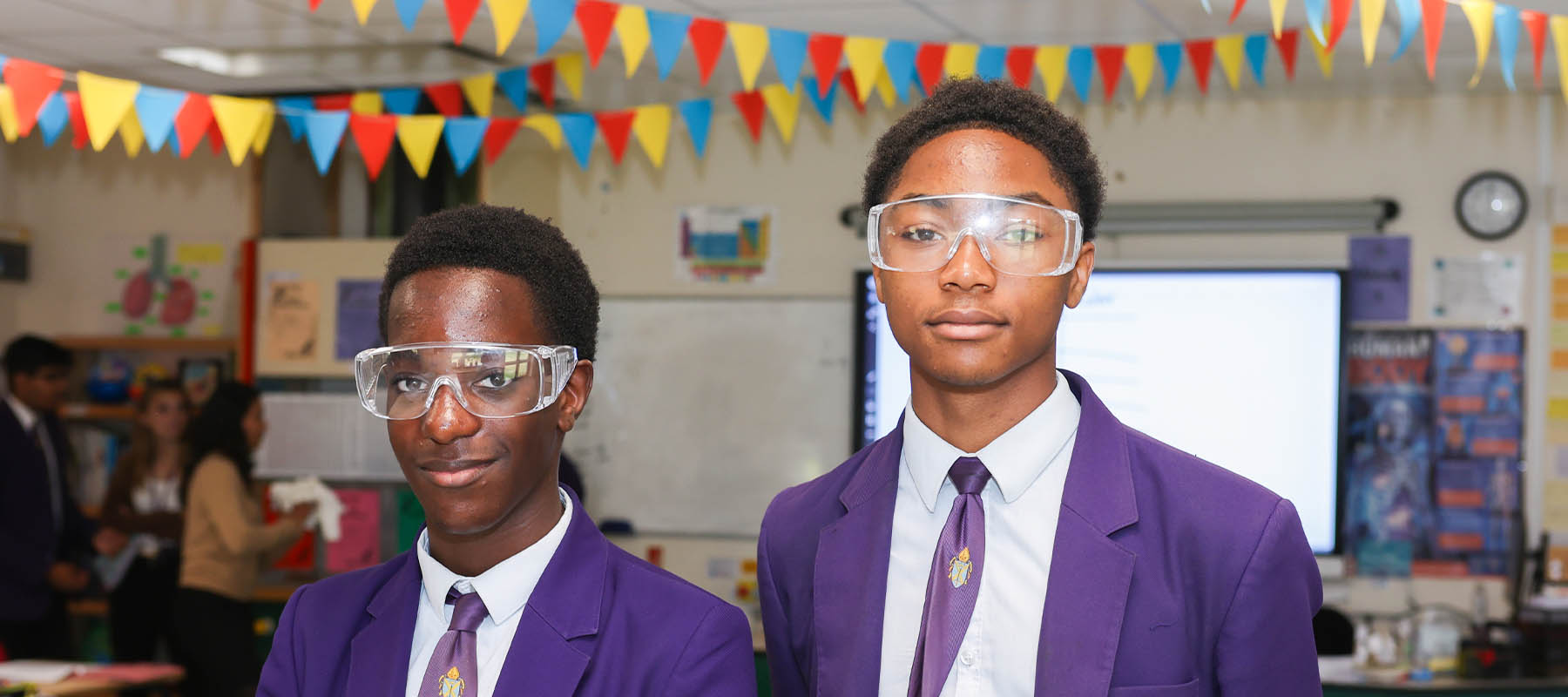Science
The Science department vision is to spark passion in our students for Science in the way that the universe works and how life is developed and maintained. Students should be leaving lessons feeling inspired by new knowledge that links them to everyday life and the future.
We teach three different disciplines which require broad substantive knowledge and deep disciplinary knowledge in Biology, Physics and Chemistry which varies from topic to topic. We anticipate all students maturing to devise insightful and key links between topics not just intra-disciplinary, but interdisciplinary. A successful curriculum has not only the capacity to build young scientists who can make links, but to inspire students to take those links even further. Students should be able to challenge both previous and current ideas and produce well-informed discussions as part of their learning to show a fluency in the language that science is. We strive to encourage students to continue to ask questions and be curious about their surroundings and ultimately intend on making young scientists out of every student.
Course Description
KS3 in the science department at Townsend takes place over the period of Y7 and Y8, with a bridging year in Y9 where KS4 teaching begins.
Students have 6 lessons a fortnight in science in KS3. This is a carefully constructed course in line with National Curriculum expectations that enables students to have a baseline of scientific skills and knowledge that builds upon KS2 learning and helps to form a bridge to future learning in science.
In KS3 students are introduced to key scientific skills that will give them the foundations of key techniques and ideas in science which are further developed as they go through to KS4.
These skills and key ideas are carefully planned into units which are regularly updated and adapted to the needs of the students.
Programme of Study
Over the period of KS3 students are introduced to a wide variety of interesting topics which include some exciting practical opportunities. The following content is covered in KS3:
- Working Scientifically
- Particle Model and Pressure
- Reproduction in Plants and Animals
- Cells
- Energy
- Light and Sound
- Universe
- Electricity and Magnetism
- Separating Mixtures
- Periodic Table, Atoms, Elements and Compounds
- Variation, Inheritance and Evolution
- Photosynthesis and Respiration
- Interdependence and ecosystem
- Forces and Gravity
- Health and lifestyle
- Earth’s Structure and Materials
- Heating and Cooling
- Acids and Alkalis
- Organ Systems, Digestion and Breathing
- Climate and Earth’s Resources
Assessment
The content of the course is divided into units containing an equal share of all three sciences (Biology, Chemistry and Physics) and assessed across the year in six end of unit assessments that have been carefully developed to assess skills as well as knowledge and is able to monitor the progress for all abilities.
Home Learning
Students complete a home learning project each term to accentuate their learning but also build on wider scientific knowledge and skills, and these often involve research. Individual teachers may also set smaller tasks that are more directly linked to class learning, such as completion of work, quizzes and revision.
Where can Science take you
Science can not only lead you down a broad range of careers and further study but it can lead you into lifelong passions and hobbies. Science is an absolute key player in the STEM (Science, Technology, Engineering, Mathematics) subjects. Whilst people follow science careers because they feel like they have an affinity for science, or an ambition, or just pure interest in the sciences, it is common knowledge that the careers are some of the top paying and most respectable in the world, whether to be an Engineer, a Researcher, or a vital role in the NHS.
Further Study
- GCSE Combined Science
- GCSE Separate Sciences
Careers
- Engineer
- Researcher
- Medicine
- Marine Biology
- Forensic Science
- Conservation Biology and Ecology
- Veterinarian Medicine
- Mechanical Engineering
How can parents support their child’s learning
- Parents can regularly check Show My Homework to check homework projects and any other notices, and should also be reading the Parentmail sent out each week for any key information.
- Parents can also encourage their children to complete extra revision at home and ensure students are equipped with pens, pencils, rulers and calculators for every science lesson as a minimum.
Useful Links
- BBC Bitesize is a great resource to help with science learning – https://www.bbc.co.uk/bitesize/subjects/zng4d2p
- Join Seneca Learning for free to help with revision, missed lessons and extra help – https://app.senecalearning.com/classroom/course/419c7523-d408-4bc7-9b96-f7f12abdacae/section/36f04bf1-20a5-4cf5-b0c4-48fb0120e7fe/session


